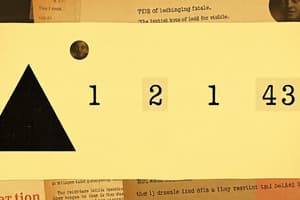Podcast
Questions and Answers
What does the function strcpy(s1, s2) accomplish?
What does the function strcpy(s1, s2) accomplish?
- It copies string s2 into string s1. (correct)
- It concatenates string s2 onto string s1.
- It converts string s2 to uppercase.
- It compares two strings for equality.
Which function would you use to combine two strings?
Which function would you use to combine two strings?
- sprintf(s, format, ...)
- strcmp(s1, s2)
- strcat(s1, s2) (correct)
- strlwr(s1)
What value does strcmp(s1, s2) return if s1 is lexicographically greater than s2?
What value does strcmp(s1, s2) return if s1 is lexicographically greater than s2?
- An undefined value
- A positive number (correct)
- A negative number
- 0
What is the purpose of the function sscanf(s, c,...)?
What is the purpose of the function sscanf(s, c,...)?
Which function is used to convert a string to a floating point number?
Which function is used to convert a string to a floating point number?
What does the C compiler do when a literal string is declared?
What does the C compiler do when a literal string is declared?
What happens when scanf() encounters a whitespace while reading a string?
What happens when scanf() encounters a whitespace while reading a string?
What does the %10s format specifier do when printing a string?
What does the %10s format specifier do when printing a string?
What is the role of the '
' character in the function gets()?
What is the role of the ' ' character in the function gets()?
When using %s format specifier in scanf, what might happen if the input string exceeds the defined width?
When using %s format specifier in scanf, what might happen if the input string exceeds the defined width?
Which function can read an entire line of input in C?
Which function can read an entire line of input in C?
What is the effect of using %-10s in printf?
What is the effect of using %-10s in printf?
Why is the '&' operator not required before a string variable when using scanf?
Why is the '&' operator not required before a string variable when using scanf?
What character is used to terminate a string in C?
What character is used to terminate a string in C?
How is a string defined in C?
How is a string defined in C?
What is the correct way to declare a string variable in C?
What is the correct way to declare a string variable in C?
Which of the following is NOT a valid way to initialize a string in C?
Which of the following is NOT a valid way to initialize a string in C?
What does the declaration 'char S[] = {'a', 'b', 'c', 'd', '
'};' represent?
What does the declaration 'char S[] = {'a', 'b', 'c', 'd', ' '};' represent?
Which of the following correctly describes the difference between a character and a string?
Which of the following correctly describes the difference between a character and a string?
If a string is initialized using char S[] = "Hello";, what will be the memory layout?
If a string is initialized using char S[] = "Hello";, what will be the memory layout?
When declaring a string variable, what does 'size' represent?
When declaring a string variable, what does 'size' represent?
What is a method to terminate a loop while traversing a string?
What is a method to terminate a loop while traversing a string?
What will the following statement compile to: 'char string1 = “hello”; char string2 = “hello”; if(string1 == string2)'?
What will the following statement compile to: 'char string1 = “hello”; char string2 = “hello”; if(string1 == string2)'?
Which function would you use to find the length of a string in C?
Which function would you use to find the length of a string in C?
In the provided frequency algorithm, what is the initial value set for frequency?
In the provided frequency algorithm, what is the initial value set for frequency?
When traversing a string using a loop, which condition keeps the loop running?
When traversing a string using a loop, which condition keeps the loop running?
Why does using '==' operator compare two strings incorrectly in C?
Why does using '==' operator compare two strings incorrectly in C?
What should be done to read a string input correctly in C?
What should be done to read a string input correctly in C?
Which header file must be included to use string functions in C?
Which header file must be included to use string functions in C?
Flashcards
String in C
String in C
An array of characters terminated by a null character ('\0')
String Literal
String Literal
A sequence of characters enclosed in double quotes (").
String vs. Character
String vs. Character
A string is an array of characters, while a character is a single letter.
String Declaration
String Declaration
Signup and view all the flashcards
String Initialization (Method 1)
String Initialization (Method 1)
Signup and view all the flashcards
String Initialization (Method 2)
String Initialization (Method 2)
Signup and view all the flashcards
Null Terminator
Null Terminator
Signup and view all the flashcards
String Array Size
String Array Size
Signup and view all the flashcards
String Initialization (char array)
String Initialization (char array)
Signup and view all the flashcards
String Initialization (literal string)
String Initialization (literal string)
Signup and view all the flashcards
scanf with strings
scanf with strings
Signup and view all the flashcards
String input width limit (scanf)
String input width limit (scanf)
Signup and view all the flashcards
String output (printf)
String output (printf)
Signup and view all the flashcards
printf with width
printf with width
Signup and view all the flashcards
gets() function
gets() function
Signup and view all the flashcards
puts() function
puts() function
Signup and view all the flashcards
String Traversal
String Traversal
Signup and view all the flashcards
String Length Function
String Length Function
Signup and view all the flashcards
Null Character
Null Character
Signup and view all the flashcards
String Function
String Function
Signup and view all the flashcards
strlen(s)
strlen(s)
Signup and view all the flashcards
Character frequency
Character frequency
Signup and view all the flashcards
String equality (C)
String equality (C)
Signup and view all the flashcards
strcpy(s1, s2)
strcpy(s1, s2)
Signup and view all the flashcards
strcat(s1, s2)
strcat(s1, s2)
Signup and view all the flashcards
strcmp(s1, s2)
strcmp(s1, s2)
Signup and view all the flashcards
atoi(s)
atoi(s)
Signup and view all the flashcards
Study Notes
Chapter 6: Strings
- Strings in C are arrays of characters terminated by a null character ('\0').
- The compiler automatically adds '\0' to the end of a string literal.
- A string literal is a sequence of characters enclosed in double quotes.
- String literals are represented by sequences of characters between double quotes.
String vs. Character
- A single character, like 'H', is stored in 1 byte (ASCII value).
- A string, like "H", is an array of character values, including the terminating '\0'.
String Declaration
- Declare a string like a one-dimensional array:
char str_name[size]; sizedetermines the string's maximum length (number of characters).
String Initialization
- Strings can be initialized in several ways:
- Using string literals:
char str[] = "Hello";(compiler adds '\0') - Using character array initialization:
char str[6] = {'H', 'e', 'l', 'l', 'o', '\0'};
- Using string literals:
- Indexes start from 0.
String Initialization Differences
- Defining literal strings automatically adds the null terminator.
- Character arrays need an explicit null terminator.
String Input/Output
scanf("%s", variable_name)reads input until a space.printf("%s", variable_name)displays the string.- Using
scanf("%[^\n]s", variable_name)allows reading strings that contain spaces.
String Input/Output (Using Width)
scanf("%10s", variable_name)limits input to 10 characters.- Using
&before the variable inscanfcan be used to solve issues when reading strings that contain spaces
String Input/Output (Using gets() and puts())
gets(variable_name)reads an entire line of input. (Note: potentially unsafe, use with caution).puts(variable_name)displays a string followed by a newline.
Traversing a String
- Traversing a string can be done using either:
- The string length using
strlen(). - The null terminator ('\0').
- The string length using
- These are useful when you need to process each character in a string.
String Functions
strlen(s): Returns the length of strings.strlwr(s): Converts all uppercase characters insto lowercase.strupr(s): Converts all lowercase characters insto uppercase.strcpy(s1, s2): Copies strings2to strings1.strcat(s1, s2): Appends strings2to the end ofs1.strcmp(s1, s2): Comparess1ands2lexicographically (returns 0 if equal, <0 if s1 < s2, >0 if s1 > s2).sprintf(s, format, ...): Formats and sends output to thesstring.sscanf(s, format, ...): Parses formatted input froms.atoi(s): Converts stringsto an integer.atof(s): Converts stringsto a floating-point number.
Exercises
- Program examples showcasing how to use these string functions are included.
Studying That Suits You
Use AI to generate personalized quizzes and flashcards to suit your learning preferences.





